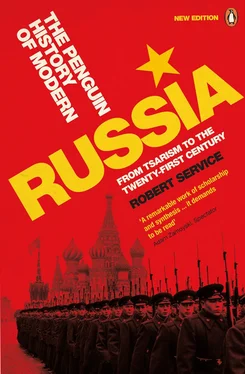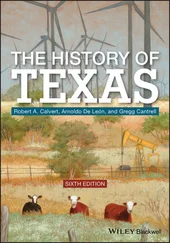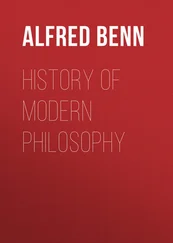Already the Provisional Government was confronted by direct social disruption. Peasants in each village put aside their mutual rivalries. The wealthier among them joined with the poor against the gentry landlords. Their activity took the form of illegally using arable land, grabbing crops and equipment, cutting timber and grazing livestock. But already in March there were three cases of outright seizure of land owned by gentry. In July, 237 such cases were reported. Admittedly there were only 116 cases in October; 22but this was not a sign that the peasants were calming down. A truer index of their mood was their increasing willingness to attack landowners and burn their houses and farming property. Whereas there had been only five destructive raids of this sort in July, there were 144 in October. 23After the harvest had been taken in, the peasantry was delivering a final warning to both the government and the landed gentry that obstruction of peasant aspirations would no longer be tolerated.
Simultaneously the slogan of ‘workers’ control’ gained in appeal to the working class. In most cases this meant that elective committees of workers claimed the right to monitor and regulate managerial decisions on finance, production and employment. In a few cases the committees completely removed their managers and foremen and took over the enterprises. Such a step was taken most often in Ukraine and the Urals, where owners had always been uncompromising towards the labour movement. Miners in the Don Basin, for example, went as far as taking their managers captive, releasing them only after Kerenski sent in army units. But even the less extreme versions of ‘workers’ control’ involved a massive interference with capitalist practices. In July it was in force in 378 enterprises. By October it had been spread to 573 and involved two fifths of the industrial working class. 24
The sailors and soldiers, too, were self-assertive. First they elected their committees in the garrisons, but quickly after the February Revolution committees were also set up by troops at the front. Commands by officers were subject to scrutiny and challenge with increasing intensity. The hierarchy of military command was no longer fully functional, especially after the Kornilov mutiny in August. Furthermore, troops caused a problem not only collectively but also as individuals. The combined effect of the unpopularity of the June offensive and the news that land was being seized in the villages induced tens of thousands of conscripts to desert. Peasants-in-uniform wanted their share of the redistributed property of the gentry. Leaping into railway carriages with their rifles over their shoulders, they added to the disorder of transport and public governance. 25
In trying to deal with such a crisis, the Provisional Government lacked the aura of legitimacy that a popular election might have conferred upon it. Ministers since February 1917 had perforce relied upon persuasion to control the populace. For the disbanding of the tsarist police limited Kerenski’s scope for repression. So, too, did the unwillingness of the army garrisons to give unstinted obedience to the Provisional Government’s orders.
Kerenski for some weeks after the Kornilov mutiny ruled by means of a temporary five-man Directory consisting of himself, the two armed service chiefs, the obscure Menshevik A. M. Nikitin and the recent Minister for Foreign Affairs M. I. Tereshchenko. But this was an embarrassing mode of rule for a government claiming to be democratic and Kerenski badly needed to widen the political base of the government. On 14 September he therefore agreed to the convocation of a ‘Democratic Conference’ of all parties and organizations to the left of the Kadets; and Kerenski himself agreed to address the opening session. But the Conference turned into a shambles. The Bolsheviks attended only in order to declare their disgust with Kerenski. Quite apart from their opposition, the Conference remained too divided to be able to supply a consensus of support for Kerenski. 26
Kerenski put on a show of his old confidence; he resolved to reassert governmental authority and started to send troops to acquire food supplies from the countryside by force. This stiffening of measures enabled him to persuade six Kadets into a Third Coalition on 27 September. Only seven out of the seventeen ministers were socialists, and anyway these socialists had policies hardly different from those of the liberals. The Provisional Government in its latest manifestation would neither offer radical social and economic reforms nor concentrate its diplomacy in quest of a peaceful end to the Great War.
The Democratic Conference proposed to lend a representative, consultative semblance to the Third Coalition by selecting a Provisional Council of the Russian Republic. This Council would include not only socialists but also liberals and would function as a quasi-parliamentary assembly until such time as the Constituent Assembly met. Formed on 14 October, it became known as the Pre-Parliament. To the Pre-Parliament’s frustration, however, Kerenski refused to limit his freedom of decision by making himself accountable to it. And the Pre-Parliament could not steel itself to stand up to him. 27Kerenski could and did ignore it whenever he liked. The long-winded debates in the Pre-Parliament simply brought its main participating parties — Kadets, Mensheviks and Socialist-Revolutionaries — into deeper disrepute. Neither Kerenski nor the Pre-Parliament possessed the slightest popular respect.
Lenin, from his place of hiding in Helsinki, saw this disarray as a splendid opportunity for the Bolsheviks. Less words, more action! For Bolsheviks, the course of Russian politics since the February Revolution vindicated the party’s argument that two lines of development alone were possible: ‘bourgeois’ or ‘proletarian’. They declared that the Mensheviks and Socialist-Revolutionaries had become agents of the bourgeoisie by dint of collaborating with liberal ministers and the magnates of capitalism.
By September Lenin was urging his party to seize power immediately (and he busily composed a treatise on The State and Revolution to justify his strategy). The Central Committee, convening in his absence, rejected his advice. Its members saw more clearly than their impatient leader that popular support even in Petrograd was insufficient for an uprising. 28But the revulsion of society against the Provisional Government was growing sharply. First the factory-workshop committees and the trade unions and then, increasingly, the city soviets began to acquire Bolshevik-led leaderships. In Kronstadt the soviet was the local government in all but name, and the Volga city of Tsaritsyn declared its independence from the rest of Russia in midsummer. By 31 August the Petrograd Soviet was voting for the Bolshevik party’s resolutions. The Moscow Soviet followed suit a few days later. Through September and October the urban soviets of northern, central and south-eastern Russia went over to the Bolsheviks.
Disguised as a Lutheran Pastor, Lenin hastened back to Petrograd. On 10 October 1917 he cajoled his Central Committee colleagues into ratifying the policy of a rapid seizure of power. The Central Committee met again on 16 October with representatives of other major Bolshevik bodies in attendance. 29Lenin again got his way strategically. In the ensuing days Trotski and other colleagues amended his wishes on schedule, insisting that the projected uprising in Petrograd should be timed to coincide with the opening of the Second All-Russia Congress of Soviets of Workers’ and Soldiers’ Deputies. Thus the uprising would appear not as a coup d’état by a single party but as a transfer of ‘all power to the soviets’.
Lenin was infuriated by the re-scheduling: he saw no need for the slightest delay. From his hiding-place in the capital’s outskirts, he bombarded his colleagues with arguments that unless a workers’ insurrection took place immediately, a right-wing military dictatorship would be installed. It is doubtful that he believed his own rhetoric; for no army general was as yet in any position to try to overthrow Kerenski and tame the soviets. Almost certainly Lenin guessed that the Kerenski cabinet was on the brink of collapse and that a broad socialist coalition would soon be formed. Such an outcome would not meet Lenin’s approval. Even if he were to be invited to join such an administration, his participation would unavoidably involve him in compromises on basic issues. Lenin did not fancy sharing power with Mensheviks and Socialist-Revolutionaries whom he accused of betraying the revolution. 30
Читать дальше












